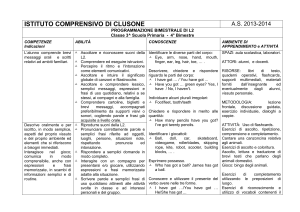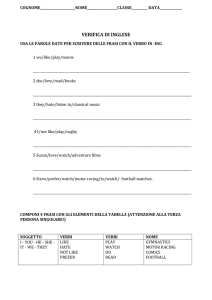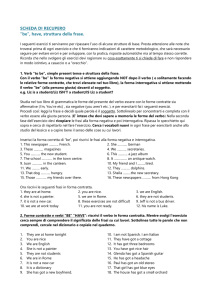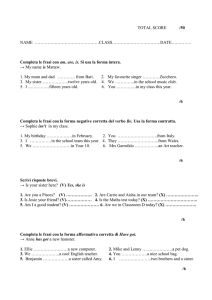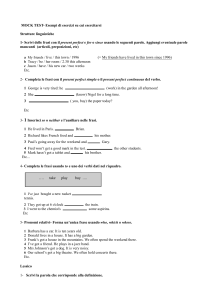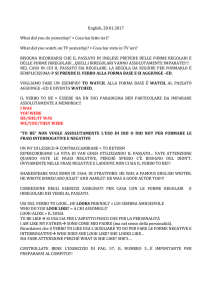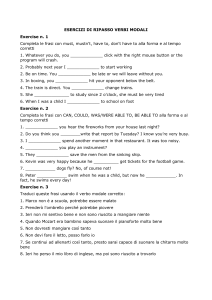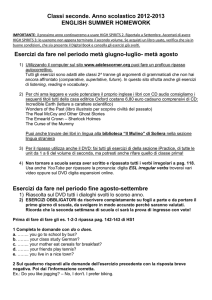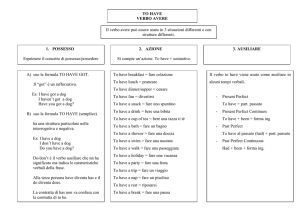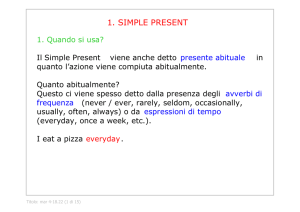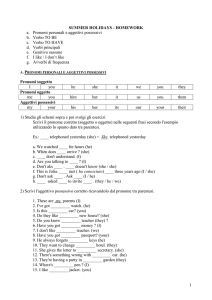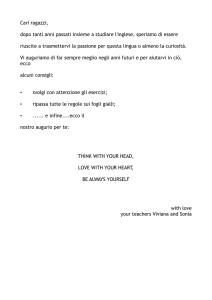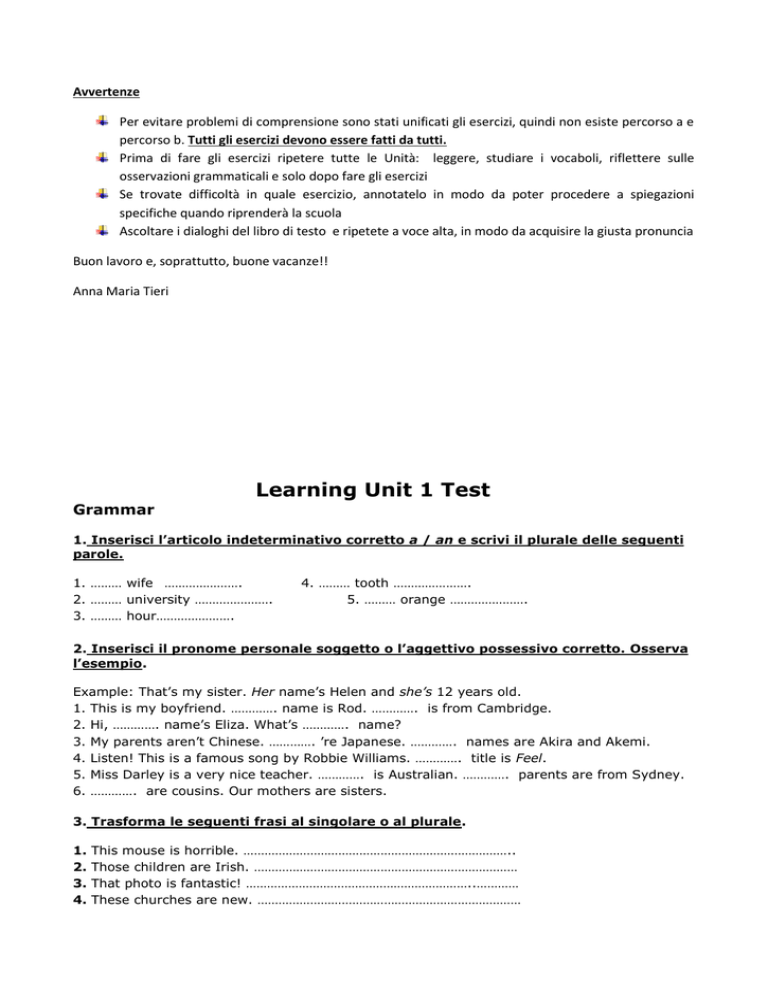
Avvertenze
Per evitare problemi di comprensione sono stati unificati gli esercizi, quindi non esiste percorso a e
percorso b. Tutti gli esercizi devono essere fatti da tutti.
Prima di fare gli esercizi ripetere tutte le Unità: leggere, studiare i vocaboli, riflettere sulle
osservazioni grammaticali e solo dopo fare gli esercizi
Se trovate difficoltà in quale esercizio, annotatelo in modo da poter procedere a spiegazioni
specifiche quando riprenderà la scuola
Ascoltare i dialoghi del libro di testo e ripetete a voce alta, in modo da acquisire la giusta pronuncia
Buon lavoro e, soprattutto, buone vacanze!!
Anna Maria Tieri
Grammar
Learning Unit 1 Test
1. Inserisci l’articolo indeterminativo corretto a / an e scrivi il plurale delle seguenti
parole.
1. ……… wife ………………….
2. ……… university ………………….
3. ……… hour………………….
4. ……… tooth ………………….
5. ……… orange ………………….
2. Inserisci il pronome personale soggetto o l’aggettivo possessivo corretto. Osserva
l’esempio.
Example: That’s my sister. Her name’s Helen and she’s 12 years old.
1. This is my boyfriend. …………. name is Rod. …………. is from Cambridge.
2. Hi, …………. name’s Eliza. What’s …………. name?
3. My parents aren’t Chinese. …………. ’re Japanese. …………. names are Akira and Akemi.
4. Listen! This is a famous song by Robbie Williams. …………. title is Feel.
5. Miss Darley is a very nice teacher. …………. is Australian. …………. parents are from Sydney.
6. …………. are cousins. Our mothers are sisters.
3. Trasforma le seguenti frasi al singolare o al plurale.
1.
2.
3.
4.
This mouse is horrible. …………………………………………………………………..
Those children are Irish. …………………………………………………………………
That photo is fantastic! ………………………………………………………..…………
These churches are new. …………………………………………………………………
4. Inserisci il verbo to be (forma affermativa, interrogativa o negativa). Usa la forma
contratta quando possibile.
1.
2.
3.
4.
5.
………… your teacher Mr Stone? No, he …………. .
We ………… Scottish, but we ………… from Edinburgh.
I ………… in Year 8. Where………… you?
Look! That’s Gwyneth Paltrow. Wow! She ………… really beautiful!
………… they from Spain? No, they …………. They ………… Greek.
5. Riscrivi le seguenti frasi usando il genitivo sassone. Osserva l’esempio.
Example: Sheila’s got a dog. Her dog is a Corgi. Sheila’s dog is a Corgi.
1. Meg has got a brother. He is eighteen. ……………………………………………….……………….
2. My uncle has got a computer. It is new. …………………………………………..…………………..
3. My sister has got a friend. He is Spanish. …………………………………………………………….
4. Sam has got a hamster. His hamster is brown and white. ……………………………………………..
5. William has got a watch. It is very big. ……………………………………………………………….
6. Inserisci il verbo have got. Usa la forma contratta quando è possibile.
1.
2.
3.
4.
5.
………… you ………… a mobile phone? No, I ………… but my brother ………… ………… one.
We ………… ………… a dog but we ………… ………… a little rabbit. His name’s Bunny.
Jenny ………… ………… long dark hair and green eyes.
………… your father ………… a computer? Yes, he …………. .
………… they ………… a skateboard? No, they …………. .
7. Completa le seguenti frasi con le question words.
1. ………… is she from? She’s from Canada.
4. ………… is your brother? He’s twelve.
2. …………’s that? It’s my new CD.
5. ………… do you spell Wilson? W-I-L-S-O-N.
3. …………’s that beautiful girl? She’s my girlfriend.
8. Riordina le parole in modo da formare delle frasi.
1.
2.
3.
4.
5.
6.
has / She / hair / wavy / got ……….…………………………………………………………………
tall / slim / are / They / and
………….……………………………………………………………
Chinese / Is / teacher / your / ? ………………………………………………………………………
new / ’s / Tom / bike / is ……..………………………………………………………………………
brother / got / you / Have / a / ? ………………………………………………………………………
hasn’t / My / dog / aunt / got / a ………………………………………………………………………
Vocabulary
9. Sottolinea l’intruso
1.
2.
3.
4.
Italy – Albanian – Dutch – Japanese
aunt – sister – cousin – friend
pink – red – dark – white
east – that – west – north
6. hamster – short – cricket – rabbit
7. thirteen – fine – three – twenty-six
8. actor – student – teacher – daughter
9. curly – glasses – wavy – straight
5. freckles – fantastic – important – famous
Functions
10. young – old – fat – box
10. Collega ogni frase con la funzione comunicativa corretta.
1. salutare in modo formale
I have.
2. presentare qualcuno
3. chiedere di fare lo spelling di una parola
4. chiedere l’identità di qualcuno
5. descrivere qualcuno
6. chiedere e dire la provenienza
7. parlare della famiglia
8. parlare di ciò che si possiede
you?
9. chiedere e dire la nazionalità
10. chiedere e dire l’età
boyfriend.
a. Have you got a mountain bike? Yes,
b. My uncle is 45. He’s a teacher.
c. Emma, this is Wallace, my brother.
d. How do you spell wavy? W-A-V-Y.
e. How old is Cindy? She’s seventeen.
f. Where are you from, Vinod? I’m from India.
g. Are you German? No, I’m not. I’m Russian.
h. Good morning, Mrs Grant. How are
i. She has got long blond hair.
j. Who’s that boy? He’s Hugh, my
Reading
11. Leggi questo brano e sottolinea l’alternativa corretta.
My name’s Pamela and I’m from Dublin. I’m fifteen years old. I’ve got a sister, Cindy, and a
brother, Walter. Cindy is ten and Walter is twelve. My father is a police officer and my mother
is a teacher. My mother isn’t Irish. She is French, she’s from Paris. We’ve got a big house.
We’ve got three pets: a dog and two hamsters. My dog, Lucky, is ten years old and he’s a bit
fat. The two hamsters are really nice! I’ve got a boyfriend. His name is Will. He’s got short
blond hair and black eyes. He’s very tall. His sister is in my class. Her name’s Alice.
1. Pamela is Irish / English.
6. Lucky is a hamster / dog.
2. Cindy is ten / fifteen.
7. Will is Pamela’s boyfriend / Pamela’s
brother.
3. Pamela’s mother is a teacher / police officer.
8. Will has got black / blond hair.
4. Pamela’s mother is French / Irish.
9. Will is short / tall.
5. Pamela has got two / three pets.
10. Will / Will’s sister is in Pamela’s
class.
Writing
12. Scrivi un breve paragrafo simile a quello di Pamela parlando di te.
Grammar
Learning Unit 2 Test
1.Completa le frasi con i verbi suggeriti all’imperativo (forma affermativa o negativa
• listen • buy • do • cross • run • play
1.
2.
3.
4.
5.
…………….. with the computer! …………….. your homework! It’s late.
…………….. in the corridor!
…………….. the road when the traffic lights are green.
…………….. that book! It’s boring.
A: …………….. to me, please! Where’s my mobile phone?
B: I don’t know, Mum.
2.Completa le frasi con le preposizioni di tempo o di luogo suggerite.
• in • on (3) • at • under • above • in front of • between • behind
1. …………… the weekend we always go the mountains.
2. A: Mum, where’s the telephone? B: Kate, open your eyes! It’s …………… your desk, ……………
you!
3. …………… the afternoon I don’t watch TV, I usually play the guitar with my friends.
4. Don’t put that poster …………… my bed! I hate that singer!
5. …………… Saturday morning I don’t go to school.
6. A: Where’s my pen? B: It’s …………… the table, …………… your exercise book.
7. A: Where’s the hotel? B: …………… the museum.
8. A: Where’s the Maths book? B: It’s on the shelf, …………… the French dictionary and the Art
book.
3. Completa le frasi con i pronomi suggeriti.
• it • them • him • her • us • me
1.
2.
3.
4.
5.
6.
Our grandparents always give …………. a lot of milk for breakfast.
I don’t like George Clooney. Do you like ………….?
A: Where’s Mrs Garfield? B: Sorry, but I don’t know …………. .
A: When do you finish school? B: I finish …………. in June.
Ross and Pam are in the same school as you. Do you know ………….?
This exercise is very difficult. Please, help …………. ! I have a Maths test tomorrow.
4. Inserisci l’ora e il verbo corretto in ciascuna frase.
1.
2.
3.
4.
7.20
13.15
15.45
22.30
At ………………………………….…………..she ………………… up.
At ………………………………….…………..they ………………… lunch.
At ………………………………….…………..I ………………… my homework.
At ………………………………….…………..he ………………… to bed.
5. Completa le frasi con il verbo suggerito alla forma interrogativa o negativa.
1.
2.
3.
4.
5.
English students ……………………… (not / go) to school on Saturday.
I ……………………… (not / drink) coffee.
……………………… (he / study) German at school?
He ……………………… (not / play) football.
……………………… (they / live) in Manchester?
6. ……………………… (she / like) History?
6. Completa le frasi con there is / there are (forma affermativa, negativa o
interrogativa) o some / any.
1. ………… …………. some orange juice in that bottle.
2. There are …………. sandwiches in the fridge.
3. Oh no! ………… …………. any pencils in my pencil case.
4. Is there …………. sugar in this coffee? Yes, there’s …………. .
5. ………… …………. any girls in your class?
6. There aren’t …………. theatres in my town, but there are …………. cinemas.
7. A: Mum, ………… …………. any jam on the table. B: Well, but there is …………. in the
cupboard.
7. Completa con some o any
1.
2.
3.
4.
5.
There’s …………… coffee but there isn’t …………… milk.
Are there …………… students in your class?
I’ve got …………… pets: two dogs and three cats.
There aren’t …………… people at the concert today.
We haven’t got …………… time. Hurry up, we’re late!
8. Completa le frasi con a / an o some.
1.
2.
3.
4.
There’s …………. ice cream in the fridge.
A: Would you like …………. apple? B: No, thanks, I’d prefer …………. banana.
There is …………. orange juice on the table.
There is …………. rice and …………. hamburger.
9. Riordina le parole e forma delle frasi.
1.
2.
3.
4.
5.
6.
Geography / I / boring / ’s / think ………………………………………………….………………..
but / difficult / like / Maths / I / is / it ……………………………………………….……………….
has / nine / at / she / dinner / often / o’clock …………………………………………………………
rarely / late / my / is / teacher / English ………………………………………………………………
for / eggs / you / breakfast / do / eat / ? ……………………………………………………………….
the / evening / in / do / never / homework / I …………………………………………………………
Vocabulary
10. Inserisci i nomi di questi oggetti d’arredamento nella stanza appropriata.
• bedside table • wash-basin • cupboard • sink • cooker • bath • wardrobe • shelf • armchair
• shower
bathroom
kitchen
bedroom
living room
………………………….
………………………….
………………………….
………………………….
………………………….
………………………….
………………………….
………………………….
………………………….
………………………….
Functions
11a Abbina ogni risposta alla domanda corrispondente.
1.
2.
3.
4.
5.
On the table.
a. Would you like some tea?
Yes, I do.
b. Have you got any tea?
Yes, please.
c. Do you like tea?
No, I haven’t.
d. Do you often drink tea?
Always, in the morning. e. Where’s my cup of tea?
11b. Adesso riscrivi le domande accanto alla funzione comunicativa corrispondente.
1.
2.
3.
4.
5.
chiedere in merito al possesso di qualcosa …………………………………………………….
offrire qualcosa ………………………………………………………………………………….
informarsi sulle abitudini di qualcuno ………………………………………………………….
informarsi sui gusti di qualcuno …………………………………………………………………
chiedere dov’è un oggetto ……………………………………………………………………….
Reading
2. Leggi l’e-mail che una ragazza inglese scrive alla sua penfriend italiana e rispondi
alle domande.
From: Alexia
To: Nora
Object: school in Britain
Dear Paola,I know you want to have some information about school in Britain. Here you
are!In my country children start primary school when they are five. When we are eleven we
go to secondary school. We attend this school from the age of five to the age of sixteen. At
secondary school we study: English, Maths, Science, History, Geography, Art, Music, one or
two foreign languages (I study French and Spanish), ICT (Information and Communication
Technology), Technology, Citizenship, PSHE (Personal Social Health Education) and Physical
Education (this is my favourite subject!!! Our PE teacher is great!). When we are sixteen we
take an exam called GCSE (General Certificate of Secondary Education). After this exam we
can leave school, or if we want we can continue to study for another two years. When
students are eighteen they take an exam called A-levels (Advanced levels) and then, if they
want, they can go to university.We usually go to school from Monday to Friday. We start at
about 9 o’clock and we finish at 3.30 or 4 p.m. We have lunch at school, but I don’t like
school food! So I eat the packed lunch I bring from home: a cheese or ham sandwich, an
apple and some chocolate. I usually drink orange juice. Sometimes we have after school
clubs: we can play a sport or play a musical instrument. On Tuesday I have piano
lessons!That’s all for now. Write to me soon about school in Italy. How many subjects do you
study? What are your favourite subjects? Do you have after school clubs? When do you have
exams?
Love, Alexia
1. How many subjects does Alexia study?
to school?
2. What is her favourite subject?
3. Why does she eat a packed lunch?
4. When do British children start going
5. When do they have GCSE exams?
Writing
3. Scrivi un’e-mail ad Alexia rispondendo alle sue domande.
Quick Test – Unit 9
1. Completa le frasi con can o can’t.
1.
2.
3.
4.
5.
6.
Elisa ………… speak English quite well because she goes to London every summer.
Help me! I ………… swim!
This Maths exercise is very difficult. I ………… do it!
………… you use a computer? No, I …………, but my brother ………… .
Gloria ………… cook at all, but her husband ………… cook quite well.
I ………… play the piano a little, but I ………… play the guitar very well.
2. Formula delle domande usando can e poi dai la risposta breve in base a quanto
indicato.
1.
2.
3.
4.
you / snowboard (yes) …………………………………………………………………………………..
she / play a musical instrument (no) ……………………………………………………………………..
your parents / speak French (yes) ……………………………………………………………………….
Frank / ride a horse (no) …………………………………………………………………………………
3. Completa le frasi con i verbi alla forma base o alla forma in -ing.
1. I love ……………… (swim). During the summer I ……………… (go) to the seaside every weekend.
2. Do you like ……………… (write) e-mails? Yes, I do. I ……………… (write) to my friends every
day.
3. I don’t mind ……………… (ski), but I prefer ……………… (skate).
4. I never ……………… (listen) to rock music. I also hate ……………… (listen) to jazz. I only like
classical music.
5. My dad doesn’t like ……………… (watch) sport on TV, but he likes ……………… (play) basketball
whit his friends.
Learning Unit 3 Test
Quick Test – Unit 10
1 Scrivi l’equivalente inglese delle seguenti date.
1.
2.
3.
4.
5.
31 ottobre …………………………………………………....
9 gennaio …………………………………………………....
22 luglio …………………………………………………......
15 marzo ………………………………………………….....
5 maggio ………………………………………………..…....
6. 10 aprile ………………………………………………….….
7. 12 luglio ……………………………………………………..
8. 3 febbraio …………………………………………………....
2. Completa le frasi con la preposizione di tempo corretta.
1.
2.
3.
4.
5.
6.
7.
John’s birthday is ……… 4th September.
……… December I always go to the mountains.
When are the Rio de Janeiro Olimpic Games? ……… 2016.
……… Saturday morning I go to the swimming pool.
……… August I don’t go to school.
The exam is ……… 8th June.
The party is ……… 6 ……… 10.
3. Completa le frasi con too e uno degli aggettivi suggeriti.
• far • young • long • hot • early • expensive
1.
2.
3.
4.
5.
6.
I can’t buy that mobile phone. It’s ……………………. .
This pasta is ……………………. . I can’t eat it.
We can’t walk to the stadium! It’s ……………………. .
These trousers are ……………………. . I can’t wear them!
Don’t go home now! It’s ……………………. .
You are ……………………. . You can’t go to the disco!
4. Esprimi in inglese le seguenti richieste
1.
2.
3.
4.
5.
chiedi
chiedi
chiedi
chiedi
chiedi
alla mamma il permesso di andare al ristorante fast food con i tuoi amici;
al commesso se puoi cambiare dei jeans;
a tua sorella di spegnere la luce;
al tuo nuovo amico di dirti il suo numero di telefono;
se puoi avere un bicchiere d’acqua.
5. Pensa alle regole che devi rispettare a casa e a scuola e scrivi quattro cose che
puoi fare e quattro cose che non puoi fare.
6. Completa le seguenti frasi.
1. A: 743 92813. ……………..?
B: Hi, Richard. …………….. Sylvia.
2. A: Can I …………….. to Ms Norman, please?
B: …………….. on, please.
3. A: …………….. I watch the rock concert on TV?
B: No, you …………….., it’s nearly midnight, it’s too …………….. .
4. A: Mum, can we buy that dog?
B: No, we can’t. It’s very big and our flat is ……………..small for it.
5. I can’t carry that box! It’s too …………….. . ……………..you help me?
End of Year Test
Grammar
1. Completa i dialoghi con il verbo to be o have got.
1. A: ………… you from Manchester?
B: No, we ………… from Manchester, we ………… from York.
A: Really? I ………… from York too! I live in the city centre. And you?
2. A: ………… you ………… any brothers or sisters?
B: Well, I ………… any brothers but I ………… a sister, Emma. She ………… 10 years old. She
………… green eyes and black hair like me.
2. Riscrivi le frasi usando il genitivo sassone. Osserva l’esempio.
Example: Sally has got a big house. Sally’s house is big.
1. My father has got a blue sports car. ……………………………………………………………
2. Vicky has got a brown and white hamster. …………………………………………………….
3. The children have got a new computer. ………………………………………………………..
4. My cousins have got a very big house. …………………………………………………………
3. Completa le domande con what, who, how, when, where, how often.
1. ……… is your birthday? 23 June.
2. ……… is your favourite subject? French.
Australia.
3. ……… is your Science teacher? Mr Gibson.
Twice a week.
4. ……… are you? Fine, thanks. And you?
5. ……… does she come from? Melbourne,
6. ……… does she have Spanish lessons?
4. Completa le frasi con una delle preposizioni suggerite.
• on (2) • between • above • in • under • at • behind
1.
2.
3.
4.
5.
6.
Paul, look! Your schoolbag is ………….your bed!
My birthday is …………. December.
The bookshop is …………. the supermarket and the restaurant.
…………. Monday afternoon, …………. 4 o’clock we have Music.
The books are …………. the shelf …………. the bed.
The garage is …………. the house.
5. Completa le frasi con can oppure can’t.
1. ………… your father play basketball? No, he ………… . He ………… only play football.
2. I ………… use the Internet very well but my sister ………… . I’m teaching her.
3. We ………… buy that T-shirt. We have enough money.
6. Scegli l’alternativa corretta.
1. ……names are Raphael and Morgan.
A They
B Their
C They’re
2.
3.
4.
5.
Come with…… to the swimming pool!
Paul! Can’t you see……!
……students speak English really well.
……computers are there in your school?
A
A
A
A
us
I
This
A lot of
B
B
B
B
we
me
These
How much
6. She is sad because she hasn’t got ……friends.
A many
7. Pop music is my favourite music and I’ve got ……CDs. A any
8. Are there…… vegetables in the fridge?
A some
9. Would you like ……orange juice?
A some
10. She doesn’t mind tennis, but she prefers ……volleyball. A play
B
B
B
B
B
a lot of
many
any
any
playing
C
C
C
C
our
my
That
How
many
C much
C a lot of
Ca
Ca
C plays
7. Completa le frasi inserendo i verbi suggeriti al Present simple (forma affermativa,
negativa o interrogativa).
• cook • get • listen • drink • work • speak • teach
1.
2.
3.
4.
5.
6.
She …………. up at 7.30 every morning.
He …………. coffee. He hates it! He prefers tea.
I …………. pasta every day. My children love it.
…………. your father …………. History? Yes, he …………. .
My mother …………. English and Italian.
…………. they …………. in a hospital? No, they …………. .
8. Completa le frasi inserendo i verbi suggeriti al Present continuous (forma
affermativa, negativa o interrogativa).
• wash • eat • read • ride • do • swim • watch
1.
2.
3.
4.
5.
I ………………. my homework. (+)
Mum ………………. TV. (–)
They ………………. fish and chips. (+)
Paul ………………. his bike. (–) He ………………. in the swimming pool. (+)
………………. Dad ………………. a book? No, he ………………. . (–) He ………………. his car. (+)
9. Completa queste frasi con il Present simple o il Present continuous del verbo
suggerito tra parentesi.
1.
2.
3.
4.
5.
6.
I ………………… to the supermarket now. Would you like to come with me? (go)
They are from India. They ………………… in Varanasi. (live)
Mum is busy at the moment. She ………………… a letter to grandma. (write)
Bernard always ………………… his homework before dinner. (do)
She ………………… a chocolate cake for my birthday. (make)
In Alaska it ………………… a lot during the winter. (snow)
Vocabulary
10. Completa queste sequenze di parole aggiungendo almeno due vocaboli a ogni
sequenza.
1.
2.
3.
4.
5.
sometimes, never, ………………… , …………………
foggy, cloudy, ………………… , …………………
doctor, mechanic, ………………… , …………………
get old, get married, ………………… , …………………
drawing, skating, ………………… , …………………
Functions
11. Collega ogni frase alla funzione comunicativa corretta.
1.
2.
3.
4.
5.
chiedere e dire la provenienza
descrivere qualcuno
offrire e accettare qualcosa
impartire istruzioni, ordini, divieti
parlare della routine quotidiana
a. What does your father do? He’s an office worker.
b. My mother gets up at half past six every morning.
c. Open the door, please. It’s very hot here.
d. Where’s your aunt from? She’s from Minnesota.
e. Have you got a skateboard? No, I haven’t. I hate
skateboarding.
6. chiedere e dire ciò che c’è o non c’è f. She’s not very tall and a bit plump.
7. parlare di ciò che si possiede
g. Would you like an apple? Yes, please.
8. parlare di ciò che sai o non sai fare h. Is there a telephone? Yes, it’s in the living room.
9. parlare delle professioni
i. What are they doing? They’re washing the dog.
10. chiedere e dire che cosa sta accadendo j. He can play football but he can’t play basketball
at all.
Reading
12. Leggi il brano e svolgi gli esercizi.
Will Partridge is 42 years old. He lives in Brentwood, about half an hour by train from
London. He is a doctor. He works in a hospital in northern London. Every morning he gets up
at 6.30. He has a shower and then at 7 he has breakfast with his wife and Gabriella, his fouryear-old daughter. Then he drives to the station where he takes a train to London. He starts
working at 8 o’clock. He is a paediatrician. At ten o’clock he has a break. He has a coffee and
a sandwich. At one o’clock he has a quick lunch in a coffee bar near the hospital. Then at 5
o’clock he goes back home. He takes his dog Toby for a walk in a park near his house. When
it is sunny his wife and Gabriella go with him. In the park there is a pond with a lot of ducks.
Gabriella likes feeding the ducks. Back home, Will does some work on the computer until 8
o’clock. He has dinner with his family and then he watches TV or reads. Twice a week some
friends come to visit them. After dinner they chat and have a beer together. At the weekend,
when he doesn’t work, he goes to Bath to visit his parents, or watches sport on TV. Today is
Sunday. Will is not working and he is in the garden cutting the grass. He likes gardening in
his free time. He is also making a new wooden house for Toby. Toby is playing with Gabriella.
They are running in the garden and playing with a ball.
pond = stagno
to feed = dare da
mangiare
12a. Decidi se queste affermazioni sono giuste (R), sbagliate (W), o se non sono
contenute nel testo (?).
R
W
?
1. Will has a shower after breakfast.
2. Will goes to the station by car.
3. Gabriella goes to a nursery school.
4. Will and his wife have got a pet.
5. Will goes to the park when it is sunny.
12b. Rispondi alle seguenti domande in modo completo.
1.
2.
3.
4.
5.
Do Will’s parents live in Brentwood?
Does Will have lunch at the hospital?
How often do Will’s friends visit him?
What does Will do in his free time?
What is he making at the moment?
Writing
13. Scrivi un breve brano in cui racconti la tua settimana tipo. Segui questa traccia:
–
–
–
–
–
–
di’ a che ora ti alzi;
di’ a che ora fai colazione, pranzi e ceni;
di’ quello che ti piace mangiare e quello invece che non ti piace;
racconta la tua giornata scolastica tipo;
esprimi qualche opinione sulle materie scolastiche;
racconta quali attività sportive o ricreative svolgi (spiega con quale frequenza).

